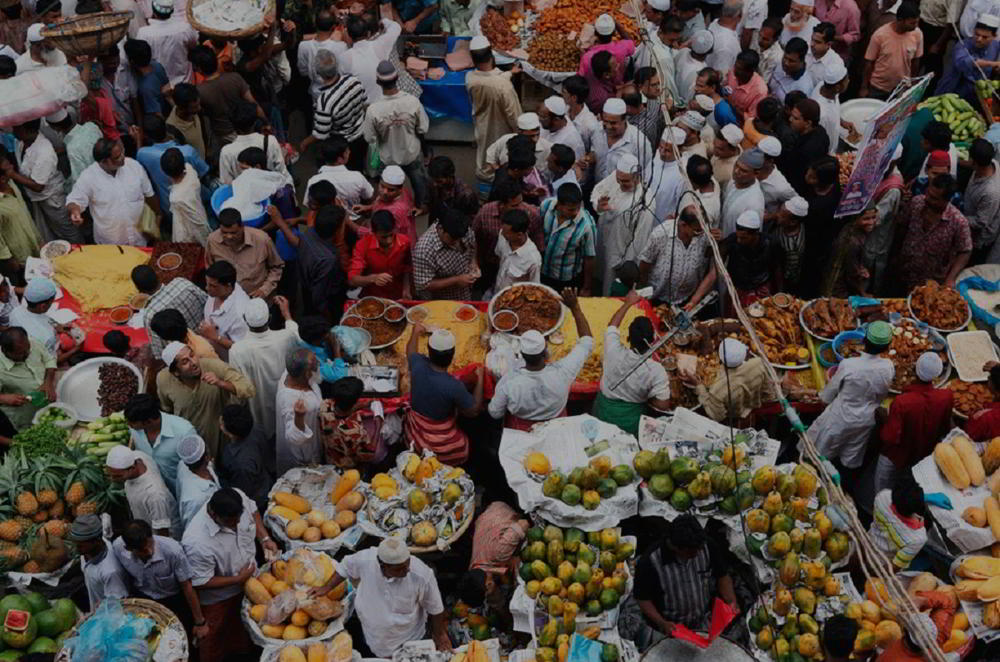
Every year, Ramadan comes to see an unusual market scenario in Bangladesh. Despite proper supply condition, prices for essential commodities go up every year. This year is no different.
According to various reports, prices of essential items have gone up. Gram is one of the few common items of Ramadan. A few days back gram sold at BDT 65-70 per kg but it sells at BDT 90-95 per kg now. A BDT 25 hike on per kg. It is not that there is a scarcity of gram in the market. On the eve of Ramadan, gram supply is on the increase.
According to Chittagong customs house, more than 1.38 lac tons of gram were imported through Chittagong port in the last four months up to April. The supply is up from 81,078 tons in the same period last year.
According to traders, there is a sharp rise in the demand for gram. While it is around 20,000 tons in a usual month, it increases to around 70,000 tons during Ramadan. Being said that, there is no short supply of gram and enough amount of the commodity has been imported.
In the month of Ramadan, there is excess demand for gram, sugar, soyabean oil, palm oil, pulses, dates, onion, and potato. Every year prices of these items increase at different level regardless of supply and demand anomaly.
Around 7.30 lac tons of edible oil, more than 2.91 lac tons of sugar, over 81,000 tons of lentils and around 41,000 tons of peas were imported through the Chittagong port in the last four months, reports Chittagong customs house. Even then the price for sugar rose by BDT 2 per kg within a week’s time.
Prices of all these items have gone high at different rates. Salt price has doubled, Price of soybean and palm oil is on the rise, loose soybean oil price has increased by BDT 10-15, green chilies by BDT 100-150. The price of pulses has increased by BDT 5-10 per kg. Prices of edible oil, onion, potato and spices have also gone up.
It is a common thing that prices of certain commodities increase during Ramadan since people consume those items more. Government and authorities take enough preparation prior of Ramadan to tackle the demand. Essential commodities are imported in tons to meet the demand in the market. Government arranges meeting with traders ahead of Ramadan to keep prices in check.
This year too, traders have agreed with the commerce secretary not to make more than 10 per cent profit. So far, this is not being maintained. According to TCB, dry chilies, turmeric, ginger, garlic and dates are selling at higher prices. According to reports, there are enough supplies of almost all items that traders are selling at a hiked price. This is a common practice for every year.
Traders are engaged in increasing prices by maintaining syndicate and creating artificial supply shortage as there is no monitoring in the market. This practice of increasing price on the eve of any major occasion is so far a Bangladeshi thing. While it makes sense in the short run, it is a killer for building a sustainable business.
Adam smith’s invisible hand does work perfectly in Bangladesh! No one knows how prices go up during a month for which government authorities and traders take special preparation.
For instance, TCB has been building stocks for Ramadan from months ago. Special monitoring teams have been in place to look after the market and make sure that no unethical force takes control of the commodity market. The intelligence agency has been working to check any artificial crisis created by syndicates. After all these measures, nothing changes. It is feared even before Ramadan, this is a very common fear, that price will be hiked by creating an artificial crisis.
Regardless of religious perspective, Ramadan is an opportunity for businesses from a purely economic point of view. People shop more, purchase more things.
It is easier to build a brand and loyal customer base during Ramadan than any other month. We have seen new brands and products are being launched on the eve of a special event.
In a Muslim majority country like Bangladesh Ramadan is the best month to launch a consumer brand. Instead of charging people unethically and making money out of one month traders can look further and make a longer term plan. Ramadan can be an opportunity to build businesses, have a loyal base of customers and starting a new movement for ethical business practices.
